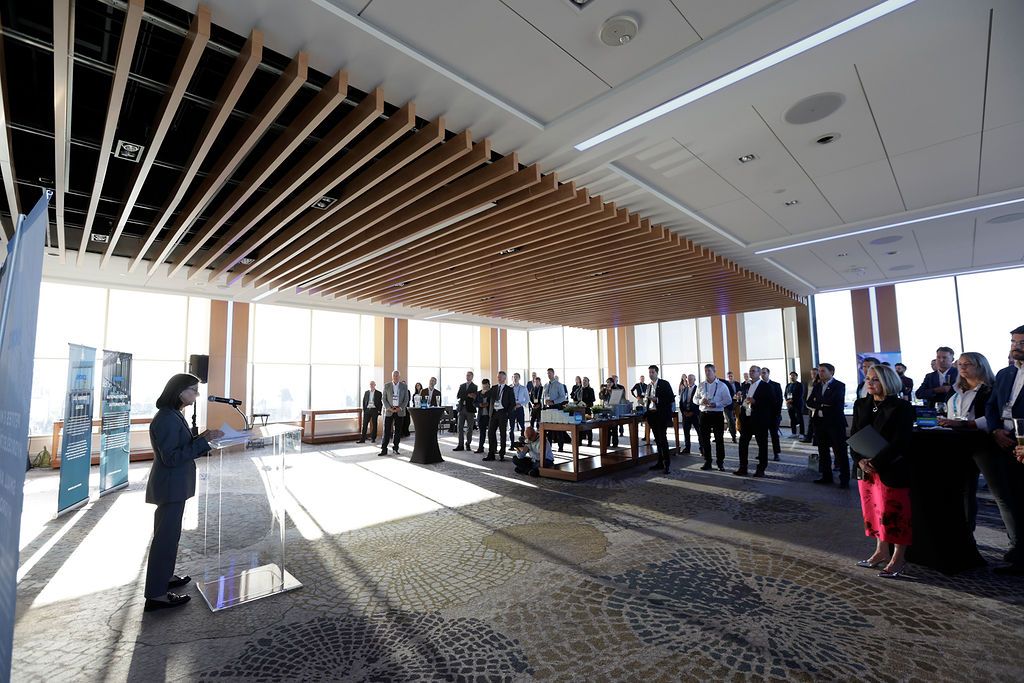More than 300 industry leaders, policymakers, Indigenous partners, and innovators gathered in Ottawa from October 1-3 for Canadian Waterpower Week 2025. Under the theme Powering Canada, Empowering the Future, delegates examined Canada’s path to a clean, reliable and affordable energy future over three days, with plenary sessions and panels tackling issues ranging from regulatory reform and cross-border trade to the role of artificial intelligence in shaping electricity demand.
Setting the Stage for Action
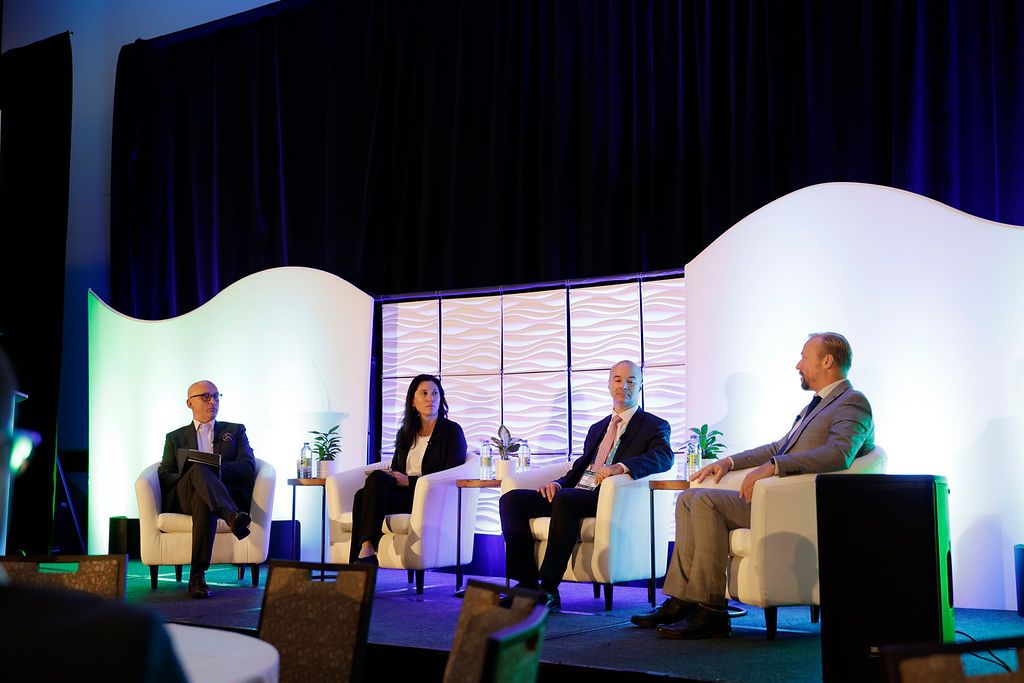
“This year’s conference underscored both the opportunities and the urgency facing Canada’s hydropower sector,” said Lorena Patterson, President and CEO of WaterPower Canada. “From energy security to economic development, reconciliation and climate action, it is clear that waterpower is essential to meeting Canada’s clean energy ambitions.”
The opening plenary, Charging Ahead? A Canadian Power Pulse Check, sponsored by TC Energy and moderated by David Cochrane, host of CBC’s Power & Politics, set an honest tone for the week. Panellists included André Bernier, director general of the Electricity Resources Branch at Natural Resources Canada; Terence Hubbard, president of the Impact Assessment Agency of Canada; and Kate Ladell, director general of ecosystems management at Fisheries and Oceans Canada.
Federal Investment in Indigenous-Led Clean Energy
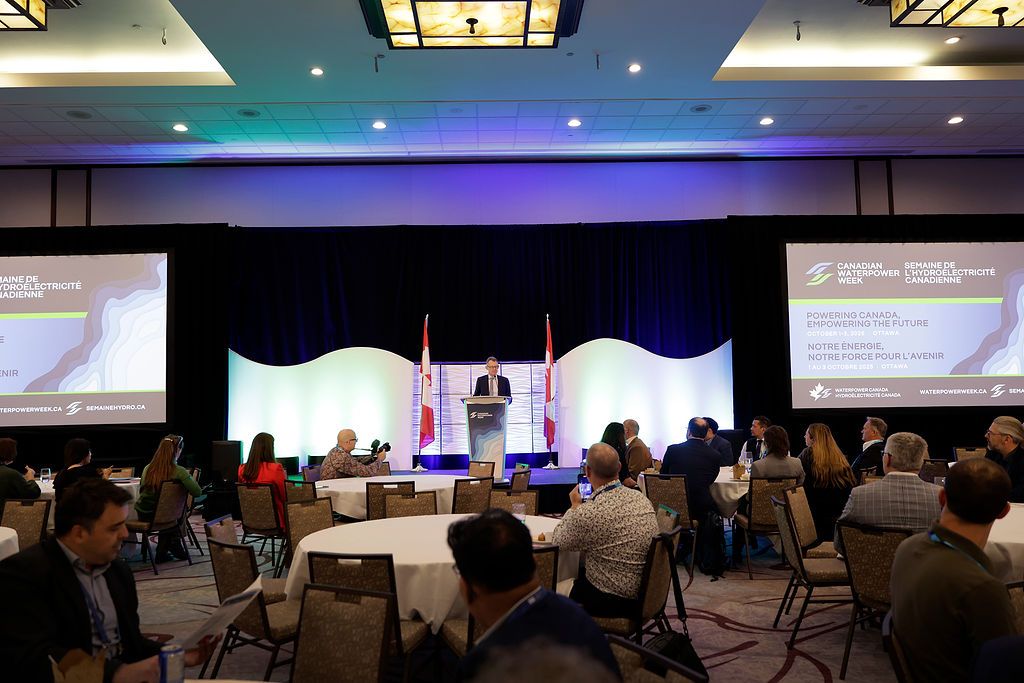
A conference highlight came with an announcement by Brendan Hanley, Parliamentary Secretary to the Minister of Northern and Arctic affairs, of nearly $17 million in funding to support a 7.5-megawatt run-of-river hydropower facility in Inukjuak, Que., in the Nunavik region, and the exploration of a 20-megawatt hydroelectric project at the Matawin dam. He was joined by Tommy Palliser, president of Pituvik Landholding Corp., and Michel Letellier, president and CEO of Innergex.
The announcement emphasized a central theme throughout the week: reconciliation and Indigenous ownership are not side streams but central to how the sector grows and how prosperity is shared more equitably in the years ahead.
Celebrating Excellence: The Inaugural WPC WaveMaker Awards
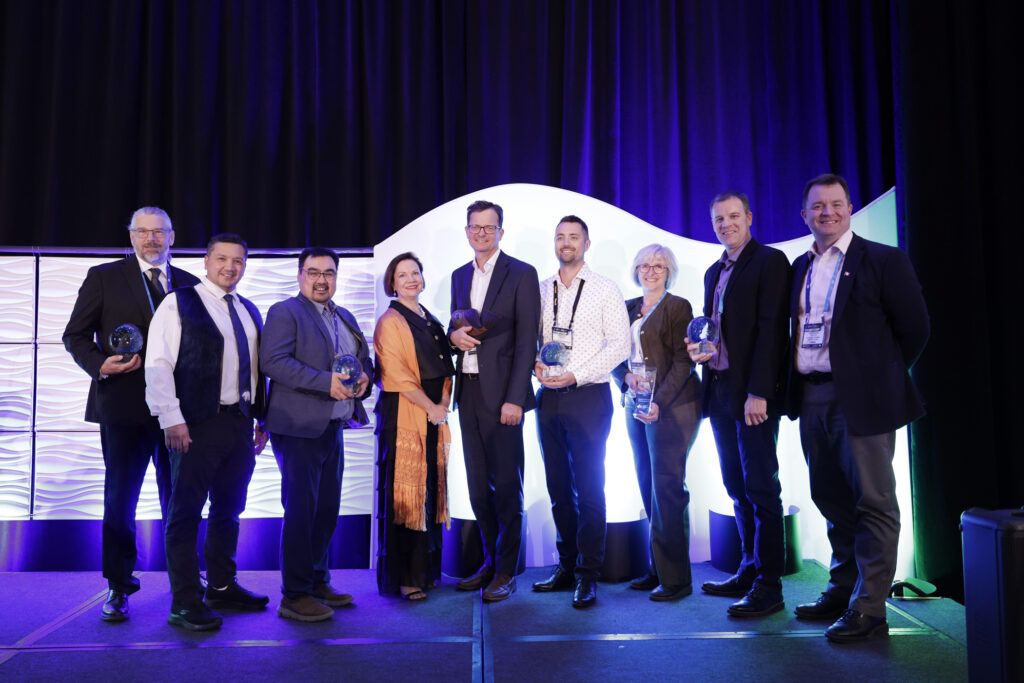
Wednesday evening’s gala dinner introduced the first-ever WPC WaveMaker Awards sponsored by GE Vernova, recognizing outstanding achievements across the sector:
- Hydropower Innovation Excellence Award went to Ontario Power Generation for their remarkable replacement of the nearly century-old tailrace deck at the Sir Adam Beck 1 Generating Station. Faced with the challenge of preserving 450 megawatts of generation during demolition and reconstruction, OPG’s team developed an ingenious solution: completing the entire replacement from a sectional barge, while keeping all ten generators online. Completed safely, ahead of schedule, and under budget, the project was designed to enhance clearance, worker accessibility, and preserve heritage architecture.
- Canadian Waterpower Achievement Award honoured Yannick Bossé, Technical Lead at AECOM, for his leadership in optimizing the designs and layouts of pumped storage hydroelectric projects across Canada, the U.S., and Australia. His work refining hydraulic design criteria and validating schemes has enhanced energy production, managed hydraulic transients, and ensured the financial viability of complex projects.
- Community Impact Award recognized Michael Thibault of Kiewit for his leadership on the English River project in Whitedog, Ontario, on the traditional lands of the Wabaseemong Independent Nations. Beyond technical success, Michael’s dedication to relationship-building has created a legacy of trust and shared benefit. Through years of engagement, he has supported Indigenous business development and helped apprentices advance to journeypersons, strengthening both the project and the Wabaseemoong community.
- Indigenous Reconciliation & Partnership Award celebrated the Innavik Hydro Project, a collaboration between the Pituvik Landholding Corporation and Innergex. By integrating traditional knowledge, local leadership, and environmental care, this project not only delivers renewable power to Inukjuak, but also creates long-term social, economic, and environmental benefits. It stands as a powerful example of what reconciliation in clean energy can look like, and a national model of shared ownership and community-driven development.
A Legacy of Leadership
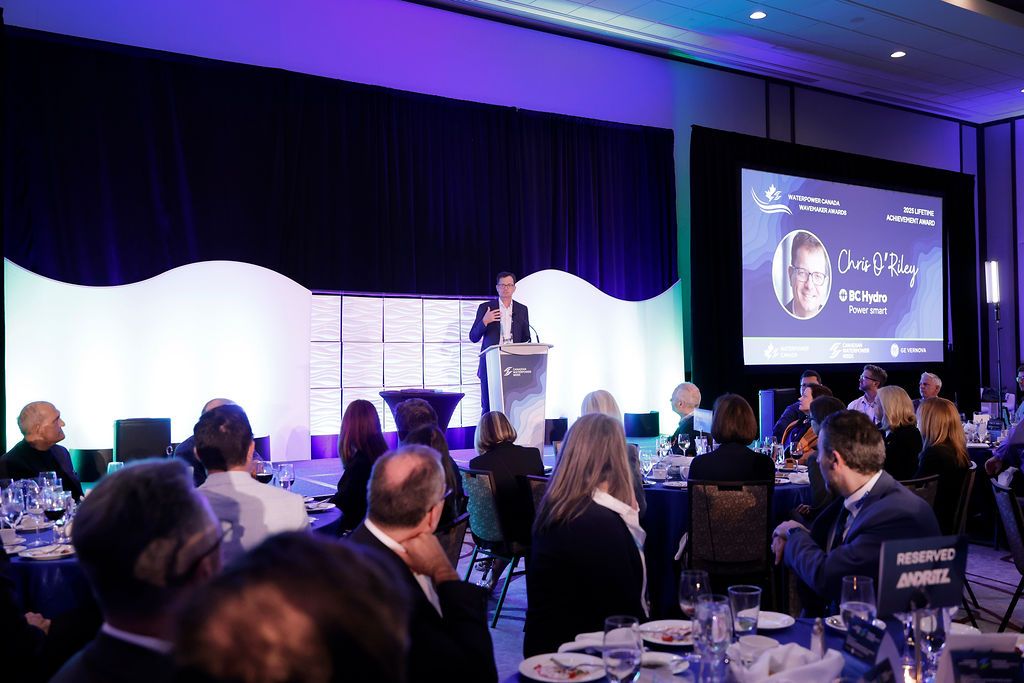
The Lifetime Achievement Award was presented to Chris O’Riley, former President and CEO of BC Hydro, recognized for a distinguished career defined by leadership, mentorship and lasting contributions to the hydropower sector.
“I’m deeply honoured to accept this Lifetime Achievement Award from WaterPower Canada,” said O’Riley. “To be recognized by an organization that champions the very resource that has powered my career—and my province—is profoundly meaningful. But this award is not just a recognition of my work—it’s a tribute to the teams, mentors and partners who’ve been on this journey with me.”
The conference also celebrated Caroline Marchand, manager of hydraulic proposals at ANDRITZ in Montreal, who received the Woman of Waterpower Award, in partnership with Women in Renewable Energy (WiRE). “Hydropower is a remarkable renewable energy source,” said Marchand. “I am proud to contribute to projects that use water as efficiently as possible to generate electricity. Our work not only supports sustainable energy production but also helps conserve our precious water resources.”
The Next Generation Takes Center Stage
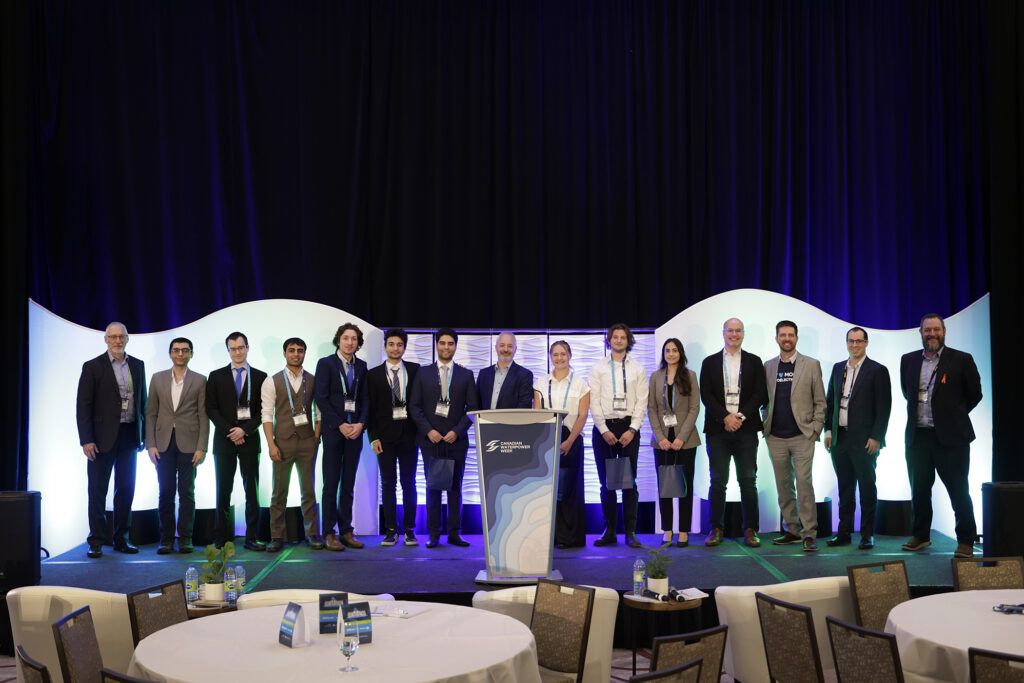
The inaugural WPC Dragons’ Dam competition, sponsored by Kiewit and Ganotec, featured student teams pitching innovative hydropower solutions. Team River Power: Tobias Nestel of the University of Victoria, and Nalyssa Runge and Tavleen Sihota of Simon Fraser University, won for a run-of-river microhydro design supporting Indigenous communities, with a case study on the Yunesit’in First Nation in B.C.’s Cariboo region.
Key Themes That Emerged
Throughout the three days, several critical themes emerged:
- Canada–U.S. partnership: Cross-border collaboration on trade and energy security isn’t optional. Hydropower is a cornerstone of reliability and decarbonization on both sides of the border, and in a time of shifting politics, the sector has a responsibility to ensure that partnership remains strong.
- Indigenous ownership and reconciliation: From equity partnerships to community-led projects and new governance models, the message was clear: reconciliation is not a side stream but central to how the sector grows and how prosperity is shared more equitably.
- Regulatory reality and workforce productivity: Conversations provided a frank look at federal commitments and what is and isn’t moving quickly enough. On the workforce side, discussions examined early planning, proactive legal and labour strategies, and inclusive workplace cultures. If projects are to be built on time and on budget, productivity has to start long before shovels hit the ground.
- Innovation and resilience: From AI and digital twins transforming operations to HydroSphereAI changing climate forecasting, new standards and satellite missions strengthening dam safety, and fish-safe turbine retrofits protecting ecosystems, these are practical tools that will help the sector manage risk, safeguard the environment, and plan with confidence.
- The strength of our fleet and storage future: From OPG’s refurbishment case studies to new strategies for older stations, and from pumped storage lessons to Site C’s technical breakthroughs, Canada has both the legacy assets and the new projects needed to deliver clean, reliable electricity for decades to come.
Looking Ahead
As the sector faces unprecedented electricity demand growth driven by artificial intelligence, electrification and data centre expansion, hydropower is poised to play a critical role. WaterPower Canada reaffirmed its commitment to working with governments, Indigenous partners and industry to modernize Canada’s clean energy system and ensure Canadians continue to benefit from hydropower’s unique strengths: clean, renewable, reliable and affordable electricity.
The conversations that began at Canadian Waterpower Week 2025 continue in organizations, communities, and across borders. Hydropower has always been the backbone of Canada’s electricity system. Now it is also the bridge connecting clean power with economic and climate goals, connecting innovation with tradition, and connecting generations of Canadians to a sustainable, resilient future.
Save the date: Canadian Waterpower Week 2026 will be taking place October 28–30, 2026, in Ottawa. Stay tuned for the Call for Abstracts and start planning your participation early! Sponsorship opportunities are already open. Please contact conference@waterpowercanada.ca for more information.

